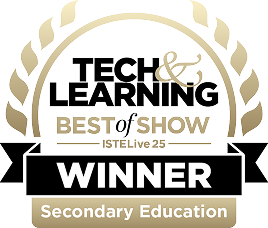Empower North Carolina Students with Essential Digital Literacy Skills
Help every K–12 student in North Carolina navigate AI, social media, and online life with confidence—while building the computer science and digital literacy skills they’ll need for school and tomorrow’s workforce.
When technology moves fast, students need trusted guidance faster.
We partner with North Carolina districts to teach healthy, responsible, and effective use of technology—without adding work to teachers’ plates.
Supporting North Carolina's Digital Literacy Vision
Learning.com has been a trusted partner with North Carolina educators, supporting the state's commitment to preparing students for success in a digital world with curriculum in AI literacy, computer fundamentals, and online assessment preparation.
Through collaboration with the North Carolina Department of Education and regional RESA centers, we provide:
- Implementation support and clear rollout plans
- Practical PD & coaching teachers can use the very next day
- Secure SIS/SSO & LMS integrations for rostering and reporting
- Flexible delivery that works across device mixes and bandwidth realities
Ready to get started?
North Carolina State-Funded Access
North Carolina Tier 1 and Tier 2 are eligible for state-funded access.
For qualifying districts, state-level support can offset costs—so you accelerate consistency, access, and impact. We’ll confirm your status quickly and help your team plan a district-wide or targeted grade-band rollout. PD, pacing, and classroom-ready lessons included.
To verify your school’s status:

Participating Charters:
- Achievement Charter Academy
- Aggie Academy
- Alamance Community Charter
- Alpha Academy
- Arapahoe Charter School
- Arts Based School
- Bear Grass Charter School
- Bethany Community School
- Bethel Hill Charter
- Community Public Charter
- Crosscreek Charter School
- Dillard Academy
- Emereau Bladen
- Faith Academy Charter
- Gary Stone Day School
- Haliwa-Saponi Tribal School
- Lake Lure Classical Academy
- Marjorie Williams Academy
- Mountain Island Charter
- Millenium Charter Schools
- NC Leadership Academy
- NEAAAT
- North East Carolina Prep
- Old Main STREAM Academy
- Rocky Mountain Preparatory
- Roxboro Community School
- Southeastern Academy
- The Capitol Encore Academy
- The New Dimensions School
- Thomas Jefferson Classical Academy
- Uwharrie Charter School
- Washington Montessori
- Wayne STEM Academy
School or District-Funded Access
A flexible path for any North Carolina school or district. Pick your scope (grade bands, schools, or district-wide), plug into SIS/SSO, and launch standards-aligned lessons with built-in pacing, reporting, and PD.
To learn how to get started:
EasyTech Digital Literacy Content Areas
We help students develop healthy and proficient relationships with technology
Aligned to NC and ISTE standards, national frameworks, CIPA, and supports House Bill 959 with online safety, social media literacy, and more.

Flexible and adaptable lessons that easily integrate into core subjects
.png?width=83&height=83&name=Preview%20(1).png)
Auto-grading and reporting tools that deliver real-time insights into student progress
One Platform, Two Complete Programs
EasyTech
Self-Paced Digital Literacy for K-12
Ready-to-teach lessons, projects, and assessments
covering device basics, productivity apps, internet
navigation, media literacy, online safety & etiquette, keyboarding and online-assessment readiness—built to
fit inside ELA, science, and social studies blocks.
EasyCode
21st Century Design, Programming,
and Critical Thinking for K-12
Scaffolded block-to-text coding pathways and creative projects that build computational thinking, problem-solving, and perseverance—so students design, test, and iterate like real creators.
Why Learning.com?
Learning.com offers a CIPA-aligned digital skills curriculum for students, covering online safety, IT fundamentals, computational thinking, and foundational AI literacy to build confidence with emerging technologies. Serving over 2 million students annually, our award-winning curriculum engages students, supports educators, and equips learners with the skills to develop safe, proficient, and healthy relationships with technology.






.png?width=280&height=280&name=ISTESeal%201%20(1).png)
